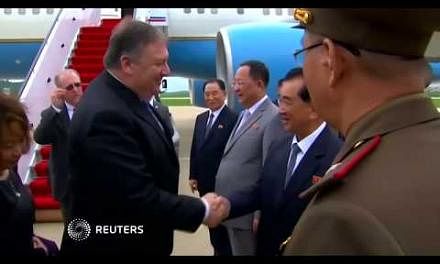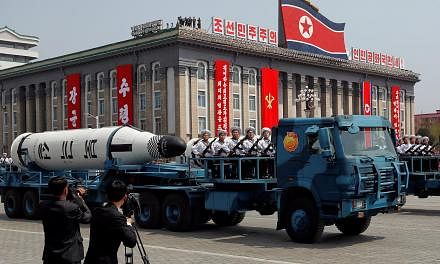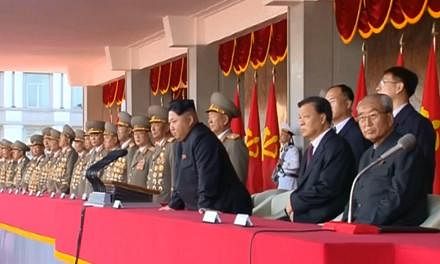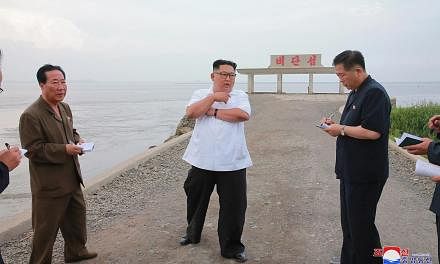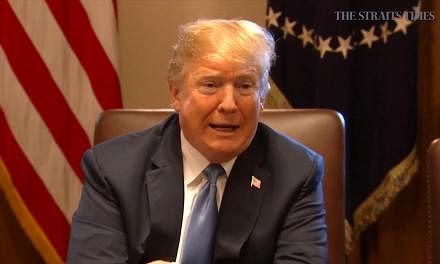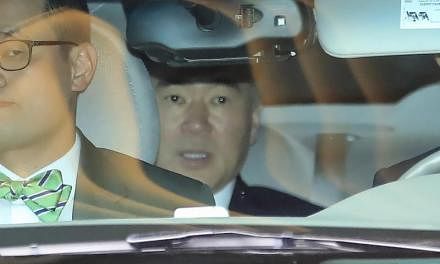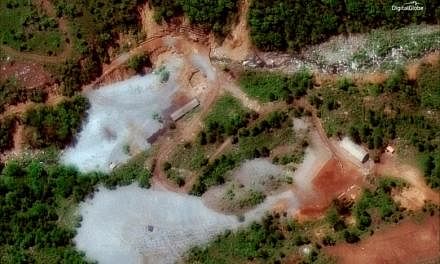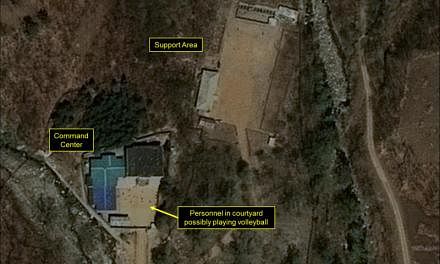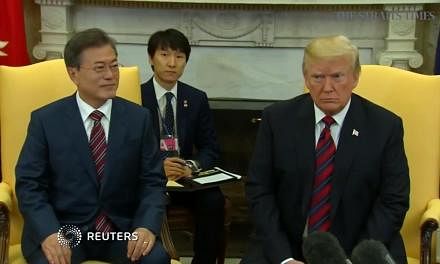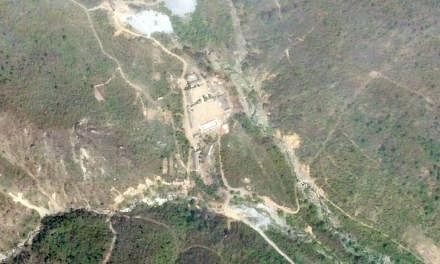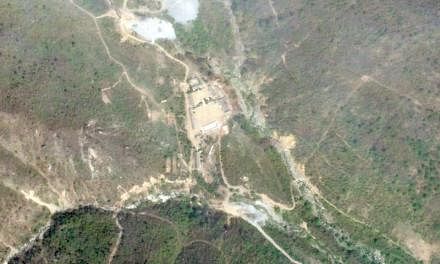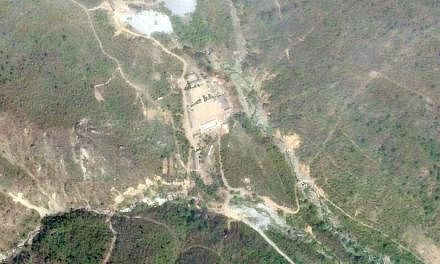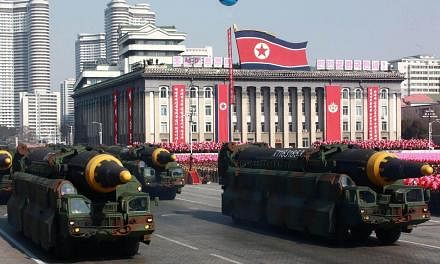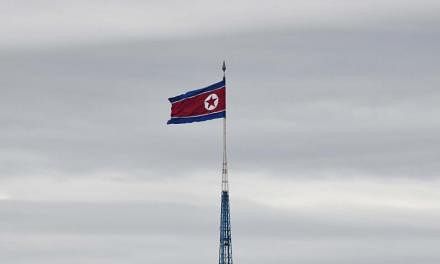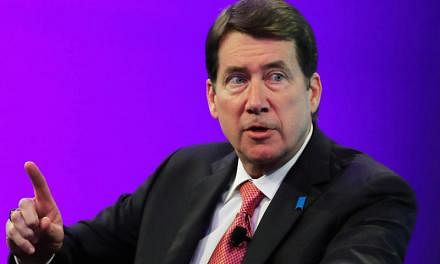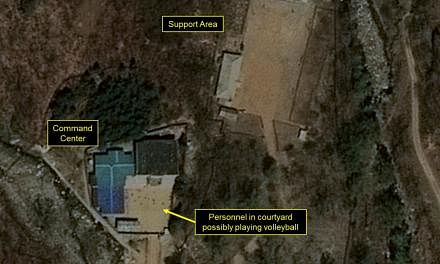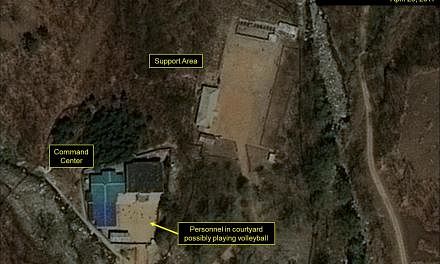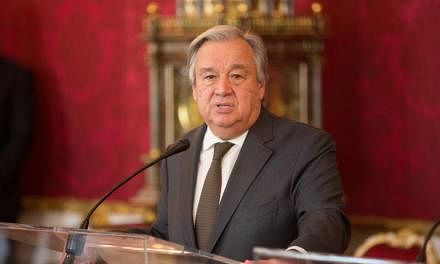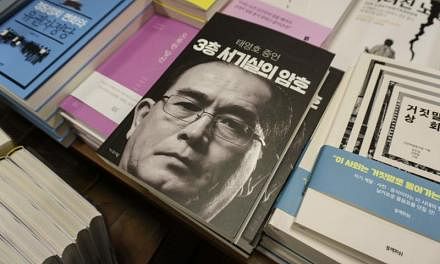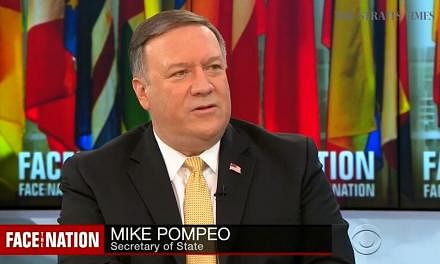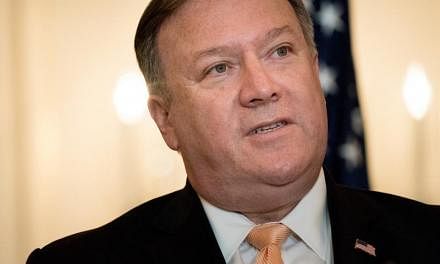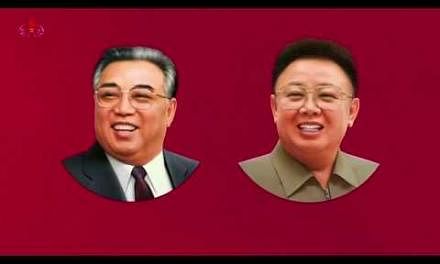TOKYO - In light of the torpedoed summit between United States President Donald Trump and North Korean leader Kim Jong Un, China has urged the two nations to exercise patience and be prepared to meet each other halfway.
Chinese Foreign Ministry spokesman Lu Kang told a daily news briefing on Friday (May 25) that the recent easing of tensions towards dialogue on the Korean peninsula "has not come by easily".
"The political resolution process is faced with a rare historic opportunity," he said.
He added: "Under the current situation, we very much hope that both North Korea and the United States can cherish the positive progress made during this period of time, maintain patience, exchange goodwill, and meet each other halfway."
Japanese Prime Minister Shinzo Abe, who is in Russia for bilateral talks with President Vladimir Putin, told reporters on Friday: "It is unfortunate that the summit has been cancelled but we fully respect and support President Trump's decision."
He said that he wanted to speak to Mr Trump by phone as soon as possible after returning to Tokyo on Sunday, and will also discuss the way forward on North Korea with Mr Putin during their planned talks on Saturday.
"What is important is that any summit will lead to a substantial advancement of the nuclear and ballistic missile weapons issues - and more important than anything else for Japan the abductions issue," Mr Abe said.
South Korean President Moon Jae In, who was apparently blind-sided by Mr Trump's announcement, said earlier on Friday that he was "very perplexed and sorry" that the summit was cancelled.
Denuclearising the Korean peninsula and ensuring a permanent peace, he added, are "historic tasks that cannot be delayed or forsaken".
South Korean Foreign Minister Kang Kyung Wha and US Secretary of State Mike Pompeo agreed in a phone conversation to "continue working towards creating the right conditions for the United States and North Korea to talk", a statement from the South said on Friday.
On Thursday, Mr Trump pulled out of what would have been the first-ever meeting between a serving US President and a North Korean leader - set for June 12 in Singapore. Mr Trump said the meeting was inappropriate given the North's "tremendous anger and open hostility".
In response, Pyongyang struck a conciliatory tone on Friday, with North Korean First Vice-Foreign Minister Kim Kye Gwan saying in a dispatch via the official KCNA news agency that Pyongyang was willing to sit down with the US "at any time, in any way, to resolve the problems".
Mr Kim Kye Gwan said the North had "inwardly highly appreciated" Mr Trump for his initial decision to hold the summit.
"We remain unchanged in our goal and will do everything we can for the peace and stability of the Korean peninsula and humankind, and we, broad-minded and open all the time, are willing to offer the US time and opportunity," Mr Kim Kye Gwan added.
In China, an editorial in the official China Daily on Friday urged both the US and North Korea to continue to keep in contact even if the summit has been cancelled.
It said: "(China) has urged the DPRK and the US to hold firm their commitment to dialogue in order to move relations forward."
It also reiterated China's commitment to a detente on the Korean peninsula, even if Mr Trump expressed doubts of China's role in Mr Kim's "little change in attitude" after he met Chinese President Xi Jinping for a second time in just weeks.
"An end to hostilities and denuclearisation of the Korean Peninsula are the goals that many countries have been working for in the past decades. Which is true of China, whatever, Trump might suggest to the contrary," the China Daily editorial said.
Japanese Foreign Minister Taro Kono, who is currently on a visit to Mexico, told reporters that recent events have hurt the atmosphere for the would-be talks.
"We have been watching the commitments by North Korea towards denuclearisation," he said. "But judging by recent trends, there is no way to conclude that the talks, if they happened, would lead to denuclearisation."
He stressed that Japan will continue to coordinate its policies with the US and South Korea, with an eye towards eventually realising a summit meeting.
The South's Unification Minister Cho Myoung Gyon, meanwhile, said Seoul will press ahead with improving ties with Pyongyang.
He was cited by Yonhap News Agency as saying: "It appears that they remain sincere in implementing the agreement and making efforts on denuclearisation and peace building."
South Korea will do its part in carrying out the Panmunjom Declaration, Mr Cho said. This refers to the deal struck by President Moon and Mr Kim at their landmark summit meeting in the truce village of Panmunjom on April 27. They had agreed to bolster ties and push towards denuclearisation of the Korean Peninsula.
Mr Trump's announcement came hours after the North - before visiting international journalists - purportedly blew up the Punggye-ri nuclear site where all of its six previous nuclear tests had been conducted.
To this, Mr Kono said: "If the nuclear test site is truly abandoned, nuclear tests will never be repeated. If the North is sincere about tackling this issue, it will never fire a missile again. Japan on its part will prepare resolutely for any emergencies while watching North Korea's response."
PUTIN: KIM 'DID EVERYTHING THAT HE HAD PROMISED IN ADVANCE'
As for European leaders - partly because their initial involvement was minimal but also because they are keen to protect a separate nuclear deal with Iran from any potential diplomatic fallout - they reacted cautiously to news that Mr Trump has decided to cancel his summit with Mr Kim Jong Un.
"We are disappointed that the meeting will no longer go ahead as planned", a spokesman for British Prime Minister Theresa May told reporters in London.
"We need to see an agreement that can bring about the completely verifiable and irreversible denuclearisation of the Korean peninsula and we will continue to work with our partners to this end", she added, in implying that, while Mr Trump's decision took Europe by surprise, Europeans are keen to continue supporting US denuclearisation initiatives.
But Russian President Vladimir Putin seized the opportunity to rebuke the US for its alleged unreliability.
"Kim Jong Un, on his side, did everything he promised", said Mr Putin at a joint press conference with French President Emmanuel Macron in St Petersburg. "He even blew up tunnels and mines on his test ranges but after that we heard that the US had cancelled the meeting."
The French President tried, however, to minimise the potential rift with Washington, by calling for renewed efforts to limit North Korea's nuclear programme.
"This process that was already launched to reduce tensions on the peninsula, and the process with the goal of denuclearisation, this process should continue," Mr Macron said.
Meanwhile, German Chancellor Angela Merkel, currently in China, has not commented on the summit cancellation.
In Australia, Foreign Minister Julie Bishop expressed disappointment, warning that a solution to the North Korea missile crisis would involve a "long drawn-out diplomatic process".
"I think we need to be cautious about progress," she told Radio 2GB. "We have seen false dawns on the part of North Korea in the past."
She called on the international community to continue applying maximum diplomatic, political and economic pressure until there are concrete steps taken by Pyongyang to dismantle its nuclear and ballistic missile weapons.
Mr Trump, speaking to reporters after pulling out of the summit, had said the decision was a "tremendous setback for North Korea and indeed a setback for the world".
A US official has said, on the condition of anonymity, that Pyongyang failed to turn up for a preparatory meeting in Singapore with the White House deputy chief of staff.
"They waited and they waited," the official told a background briefing in Washington. "The North Koreans never showed up. The North Koreans did not tell us anything, they simply stood us up."
Mr Trump's pullout came hours after North Korea had, through a statement by Vice-Foreign Minister and long-time nuclear negotiator Choe Son Hui, called US Vice-President Mike Pence a "political dummy" and threatened a "nuclear-to-nuclear showdown" after Mr Pence said the North could end up like Libya.
The statement by Mr Kim Kye Gwan, the First Vice-Foreign Minister, also pinned the blame on the US for its so-called "tremendous anger and open hostility", which was a reaction to the "unbridled remarks made by the US side which has long pressed the DPRK unilaterally to scrap (its) nuclear programme" ahead of the summit.
The North has reacted strongly since US National Security Advisor John Bolton made a proposition last week that the so-called Libya model be used for its denuclearisation. Libyan leader Muammar Gaddafi was murdered years after he surrendered his nuclear weapons.
Pyongyang has also said that unlike the nascent Libyan programme, it had successfully achieved intercontinental ballistic missile capabilities that will allow it to launch strikes on the US mainland.
Kobe University security expert Tosh Minohara told The Straits Times: "I think even if they met, the conclusion would not be something that would bring permanent peace - it would most likely be very unsatisfactory and a temporary peace at best."
"This outcome forces us to realise who we are dealing with, and how apart their positions are."
Mr Richard Heydarian, a political analyst with Philippines' De La Salle University, said the summit's cancellation was "far from surprising, considering the rapid souring of the rhetoric in recent weeks".
"The Trump administration's insistence on unilateral denuclearisation was bound to nip the peace potential in the bud," he said.
North Korea has "little reason" to trust Mr Trump, Mr Heydarian told The Straits Times, and "any insistence on a 'Libya model' of negotiations would have been unacceptable".
"So one gets to ask, whether hawks like National Security Adviser John Bolton were deliberately seeking to undermine the whole peace effort from the very beginning or were just, frankly, incompetent enough to miss the geopolitical reality on the ground," he said.
Additional reporting by Goh Sui Noi in Beijing, Jonathan Eyal in London, Jonathan Pearlman in Sydney and Raul Dancel in Manila


